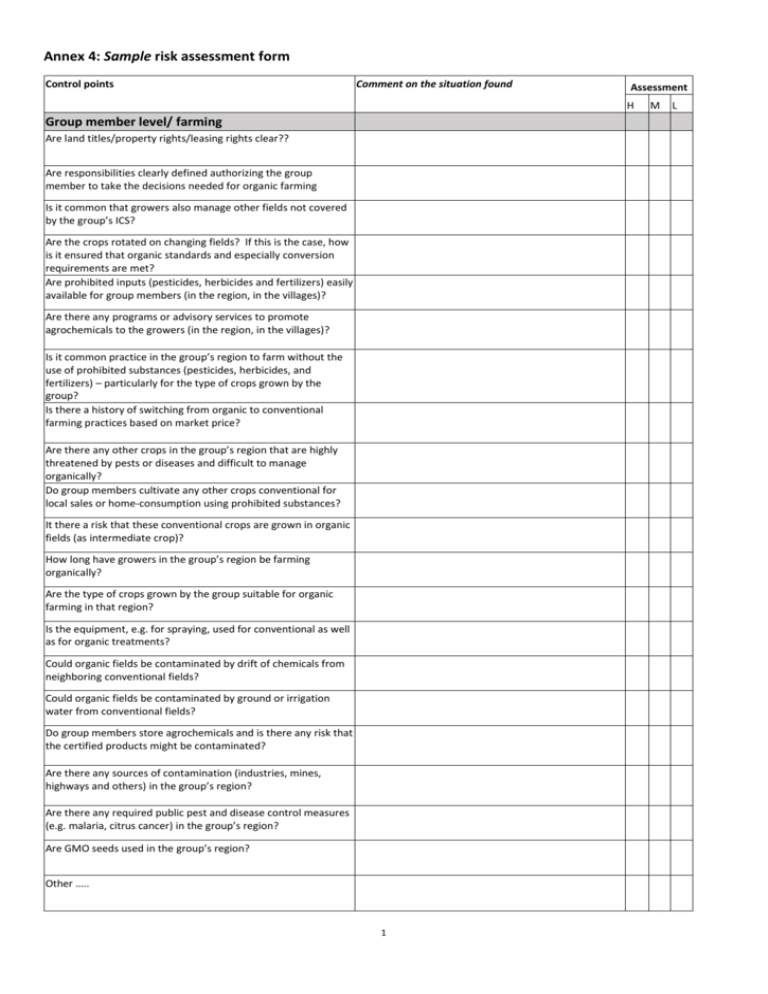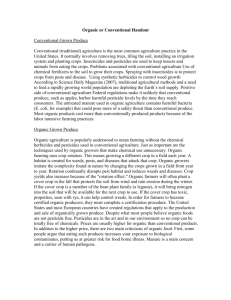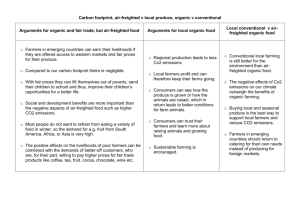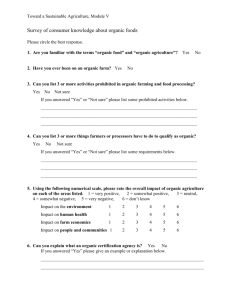Organic Farming Risk Assessment Form
advertisement

Annex 4: Sample risk assessment form Control points Comment on the situation found Assessment H Group member level/ farming Are land titles/property rights/leasing rights clear?? Are responsibilities clearly defined authorizing the group member to take the decisions needed for organic farming Is it common that growers also manage other fields not covered by the group’s ICS? Are the crops rotated on changing fields? If this is the case, how is it ensured that organic standards and especially conversion requirements are met? Are prohibited inputs (pesticides, herbicides and fertilizers) easily available for group members (in the region, in the villages)? Are there any programs or advisory services to promote agrochemicals to the growers (in the region, in the villages)? Is it common practice in the group’s region to farm without the use of prohibited substances (pesticides, herbicides, and fertilizers) – particularly for the type of crops grown by the group? Is there a history of switching from organic to conventional farming practices based on market price? Are there any other crops in the group’s region that are highly threatened by pests or diseases and difficult to manage organically? Do group members cultivate any other crops conventional for local sales or home-consumption using prohibited substances? It there a risk that these conventional crops are grown in organic fields (as intermediate crop)? How long have growers in the group’s region be farming organically? Are the type of crops grown by the group suitable for organic farming in that region? Is the equipment, e.g. for spraying, used for conventional as well as for organic treatments? Could organic fields be contaminated by drift of chemicals from neighboring conventional fields? Could organic fields be contaminated by ground or irrigation water from conventional fields? Do group members store agrochemicals and is there any risk that the certified products might be contaminated? Are there any sources of contamination (industries, mines, highways and others) in the group’s region? Are there any required public pest and disease control measures (e.g. malaria, citrus cancer) in the group’s region? Are GMO seeds used in the group’s region? Other ….. 1 M L Internal control Is the distance between production units manageable for internal control and product purchase? Do ICS staff have the required means (e.g. finance, infrastructure, means of transport) to manage the ICS and realize internal control? Are the number of internal inspectors appropriate for implementing the ICS considering the number of group members, location, distances and complexity? Are responsibilities defined in such a manner that conflicts of interest can be excluded? Other …. Buying, transporting, storing, processing Is there a big price gap between organic and conventional product? (Risk that group members buy from conventional neighbors and sell the product as organic)? Does the purchase center only buy products from approved group members, and if applicable, that different qualities (organic in transition, conventional) are kept separated? How are purchasers paid? Is their payment dependent on quantity purchased? Is commingling of products of different quality at the purchase center and storage facilities managed and prevented? Have all the staff responsible for handling of organic products been trained on the specific requirements? Are ingredients and auxiliary substances used for processing provided to, and approved by the certifier? Are organic product managed to prevent contamination with agrochemicals during storage? (pest control during storing) Are transport, equipment and storage facilities treated with prohibited substances (even not export container)? Other … Risk Level: H= high risk; M= medium risk, L=low risk Example for the evaluation of identified risks and preventive measures taken: Critical control point and situation found Organic production of the home consumption crops is difficult (requires more efforts) and some of the group members still grow vegetables for local sales conventionally, and store agrochemicals in their house that are used in their vegetable garden. Organic treatments are organized by the group and sprayed by airplane. The planes are also used by conventional farms. There is a risk that residues of conventional products remain in the airplane and contaminate the organic field Many group members have conventional neighbors who spray with backpack sprayers. In the Preventive measures intensify training of group members on organic cultivation methods also for home consumption crops more frequent field advisor visits with focus also on vegetables inform group members about danger of agrochemicals for their health and for the environment Additional (unannounced) internal inspections in order to guarantee that no prohibited products are used in the organic fields. Tanks of the plane are always cleaned at least three times before use. Ask certifier which products to use for cleaning Develop an ICS form to document the cleaning and list of substances used for cleaning. ICS needs to assure that buffer zones are defined and managed by the group member. 2 neighborhood or region conventional land is treated by Conventional neighbors are informed about the buffer zone airplane. There is certain risk of contamination of the and to avoid spraying in those areas. organic fields, esp. from aerial spraying If neighboring fields are treated by airplane, there needs to be a buffer zone of at least 50 meters. The internal inspectors need to be instructed to specifically verify the situation Some group members store old agrochemicals which The internal inspector needs to be instructed to check the had been a gift during electoral campaign 5 years ago products stored by each group member on the internal inspection form All old products must be removed immediately. A solution has to be found as to what to do with them. The irrigation water comes in canals directly to the Check during internal inspection. fields. And there is a risk that overflow water from conventional parcels flows back into the irrigation channel Sometimes farmers may receive “organic” products Farmers receive a clear list with allowed inputs, all others are distributed by government. prohibited. Advisors shall stress that during visits. Government is presently promoting organic through Ensure good contact with government extension programs. extension agents and advisors, but this may change. Keep informed on possible changes in strategy of the advisors. There is a certain risk that farmers could sell Inform farmers on consequences of such a behavior. conventional products from other farms as organic, and Implement spot checks during harvesting. one such case occurred. 3






